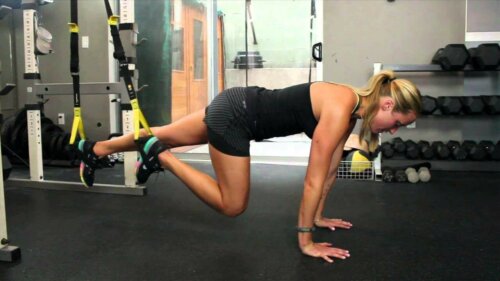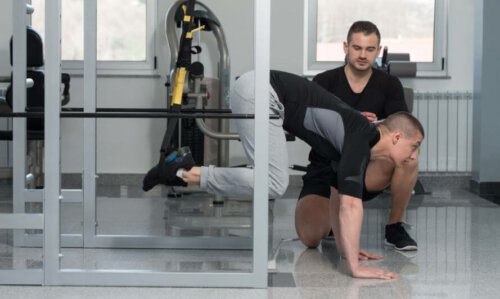Suspension-Based Abdominal Training With TRX

There are different techniques to get bodybuilder or movie star level abs. But it’s clear that we often get bored of repeating the same exercises. To combat this, in this article we’ll tell you how to do suspension-based abdominal training using TRX.
How to train with TRX
Before we get to how to do a suspension-based abdominal training routine, we should probably tell you what TRX is. It’s not the name of a model of car or bike, but rather a kind of exercise in which you ‘hang’ from a nylon belt that has high resistance and use your body weight to train.
It only requires you to hang some strips of the fabric to a structure – for example the bars at a gym or close to home – and do the functional exercises. These exercises work the whole body in general, but those muscles directly involved in the movement and are exerted become defined quicker.
The practice of TRX exercises was developed in the military and currently is one of the most used techniques in gyms. Regardless of your age, weight, or condition, you can enjoy its benefits: the exercises and movements are in accordance with your capabilities.
There are too many benefits to ignore: it tones the muscles, increases flexibility, improves stability, and allows you to gain explosive strength.
Suspension-based abdominal training
Thanks to TRX, you can work your legs, glutes, pecs, shoulders, back. arms… and of course your abs! This is also the zone it’ll develop the most since a lot of the strength that these exercises require must come from your core. As part of the suspension-based abdominal training you can do the following exercises:
1. Plank
This is the star of the gym, given its results. We recommend that you do the without the TRX first until you become accustomed to the posture and effort it requires.

Once you feel prepared, it’s just a question of making it a little more complex; fit one foot into each of the loops of the belt and put yourself face down on the mat. Support yourself on your forearms and straighten your legs; keep your back parallel to the floor and hold that position for at least 30 seconds.
2. Mountain climbers for suspension-based abdominal training
You may know this exercise from other abdominal routines. For this exercise, you also have to hook your feet into the loops on the belt, but here you should support yourself on the palms of your hands on the mat.
One leg at a time, bring your knee to touch your chest. When you straighten it, bend the other. This movement should be fast and rhythmic.

3. Knees to chest
This is similar to the one above but requires you to bring both knees to touch (or try to touch) your chest at the same time. It’s very important that your back doesn’t arch too much, as this can cause pain. Another version of this exercise can consist of bringing your knees to your elbows: twist with your hips and bring both knees towards one side, as if you were trying to touch your elbow.

4. Rollout for suspension-based abdominal training
A suspension-based abdominal training routine also includes exercises done on your feet. The roll-out allows you to work the whole abdominal zone. To do this, you need to do it properly!
Take each loop in your hands; raise your arms at the same time that you incline your body forward. Go as far as you can, but the idea is to keep the body diagonal to the floor.

5. Hip lift
The last of the exercises in our suspension-based abdominal training routine is done on your back. Place your heels inside the TRX hoops and your arms at the side of your body.

Lift your pelvis up until your torso is diagonal to the floor. When resting, don’t let your glutes touch the ground!
There are different techniques to get bodybuilder or movie star level abs. But it’s clear that we often get bored of repeating the same exercises. To combat this, in this article we’ll tell you how to do suspension-based abdominal training using TRX.
How to train with TRX
Before we get to how to do a suspension-based abdominal training routine, we should probably tell you what TRX is. It’s not the name of a model of car or bike, but rather a kind of exercise in which you ‘hang’ from a nylon belt that has high resistance and use your body weight to train.
It only requires you to hang some strips of the fabric to a structure – for example the bars at a gym or close to home – and do the functional exercises. These exercises work the whole body in general, but those muscles directly involved in the movement and are exerted become defined quicker.
The practice of TRX exercises was developed in the military and currently is one of the most used techniques in gyms. Regardless of your age, weight, or condition, you can enjoy its benefits: the exercises and movements are in accordance with your capabilities.
There are too many benefits to ignore: it tones the muscles, increases flexibility, improves stability, and allows you to gain explosive strength.
Suspension-based abdominal training
Thanks to TRX, you can work your legs, glutes, pecs, shoulders, back. arms… and of course your abs! This is also the zone it’ll develop the most since a lot of the strength that these exercises require must come from your core. As part of the suspension-based abdominal training you can do the following exercises:
1. Plank
This is the star of the gym, given its results. We recommend that you do the without the TRX first until you become accustomed to the posture and effort it requires.

Once you feel prepared, it’s just a question of making it a little more complex; fit one foot into each of the loops of the belt and put yourself face down on the mat. Support yourself on your forearms and straighten your legs; keep your back parallel to the floor and hold that position for at least 30 seconds.
2. Mountain climbers for suspension-based abdominal training
You may know this exercise from other abdominal routines. For this exercise, you also have to hook your feet into the loops on the belt, but here you should support yourself on the palms of your hands on the mat.
One leg at a time, bring your knee to touch your chest. When you straighten it, bend the other. This movement should be fast and rhythmic.

3. Knees to chest
This is similar to the one above but requires you to bring both knees to touch (or try to touch) your chest at the same time. It’s very important that your back doesn’t arch too much, as this can cause pain. Another version of this exercise can consist of bringing your knees to your elbows: twist with your hips and bring both knees towards one side, as if you were trying to touch your elbow.

4. Rollout for suspension-based abdominal training
A suspension-based abdominal training routine also includes exercises done on your feet. The roll-out allows you to work the whole abdominal zone. To do this, you need to do it properly!
Take each loop in your hands; raise your arms at the same time that you incline your body forward. Go as far as you can, but the idea is to keep the body diagonal to the floor.

5. Hip lift
The last of the exercises in our suspension-based abdominal training routine is done on your back. Place your heels inside the TRX hoops and your arms at the side of your body.

Lift your pelvis up until your torso is diagonal to the floor. When resting, don’t let your glutes touch the ground!
This text is provided for informational purposes only and does not replace consultation with a professional. If in doubt, consult your specialist.








